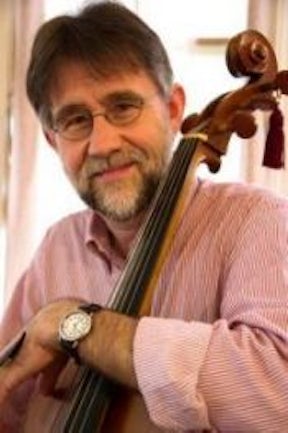Oude muziek
Een overzicht van actoren in de oude muziek

Marc Vanscheeuwijck
Marc Vanscheeuwijck is a baroque cellist and professor of musicology at the University of Oregon. Vanscheeuwijck teaches the undergraduate and graduate music history surveys of the Baroque and Classical periods, Performance Practice, Baroque Cello, Oratorio Workshop, and co-directs the Collegium Musicum ensemble, which specializes in early music.
Graduate seminar topics have included Monteverdi, Bach’s Sacred Cantatas, Organology, Baroque Culture, Latin American Baroque Music, Seventeenth-Century Italian Sacred Music, Boccherini, French Baroque Music from Lully to Rameau, Music in Naples and Bologna 1500-1700, Musical Iconography, Rhetoric and Music, etc. He also taught a course on Styles in History in the Humanities program. As a teacher and guest lecturer he regularly offers seminars and master classes on various topics in music and performance practice of the Baroque period at the Conservatories of Brussels, The Hague, Amsterdam, Paris, Leipzig, Prague, Brno, and at the Universities of Alcalà de Henares, Évora, Zagreb, and the Museo della Musica in Bologna.
Vanscheeuwijck is a frequent performer and recording artist with European early music ensembles, including the Cappella Musicale di San Petronio (Bologna), More Maiorum (Antwerp), Collegium Marianum (Prague), Ensemble Odhecaton (Milan), the Oregon Bach Collegium (Eugere), and regularly conducts the Jefferson Baroque Orchestra (Ashland) and the University of Oregon Oratorio Ensemble.
Vanscheeuwijck studied cello and chamber music at the Bruges and Ghent Conservatories and baroque cello with Wouter Möller; he holds degrees in art history, Romance languages, and pedagogy, and a doctorate in musicology from the University of Ghent (1995). His current research focuses on late 17th-century music in Bologna and on the history and repertoire of bass violins. He has published articles in Musica Antiqua (1985-91), in La Cappella Musicale nell’Italia della Controriforma (1993), in Performance Practice Review (1995-96), in the Alamire Yearbook (1998/2000), in La Figura e l’opera di Antonio Cesti nel Seicento europeo (2003), and in the yearbooks of the Orpheus Institute and of the A.M.I.S., Como (2006, 2011, 2013, 2018). Several articles he revised on Bolognese composers appeared in the New Grove Dictionary of Music and Musicians (2001) and in Die Musik in Geschichte und Gegenwart (1994-2006). Vanscheeuwijck’s book titled The Cappella Musicale of San Petronio in Bologna under Giovanni Paolo Colonna (1674-1695): History-Organization-Repertoire was published in 2003 by the Belgian Historical Institute in Rome. His most recent research on the Baroque cello has appeared in Performance Practice Review (2008-09), Early Music (2010), and a chapter on “Violoncello and Violone” is included in the second edition (Indiana U.P., 2012) of A Performer’s Guide to Seventeenth-Century Music edited by Stewart Carter (revised and expanded by Jeffery Kite-Powell). In 2016, he produced a bilingual (French & English) volume titled Cello Stories. Une histoire du violoncelle aux XVIIe et XVIIIe siècles / The Cello in the 17th and 18th Centuries with 5 CDs recorded by Bruno Cocset and Les Basses Réünies for Alpha in Paris (text available here). He co-edited a volume of essays with Guido Olivieri Arcomelo 2013. Studi nel terzo centennario della morte di Arcangelo Corelli (2015), and is the editor of another volume of essays The Bononcinis: From Modena to Europe, 1666-1747 (2019), both for the Libreria Italiana Musicale in Lucca.
His work as a musicologist includes the writing of liner notes and program notes for a variety of CD companies and early music festivals, and the publication of critical facsimiles and editions. Already available (from Forni in Bologna) are the facsimiles of Domenico Gabrielli’s complete works for cello solo and with basso continuo (1998), Giuseppe Jacchini’s Opus 1 (2001), and Giovanni Battista degli Antonii’s Opus 1 (2006).
Een overzicht van actoren in de oude muziek
Steunpunt voor beeldende kunsten, podiumkunsten en klassieke muziek.